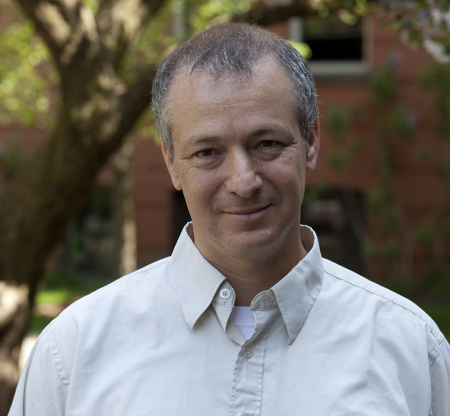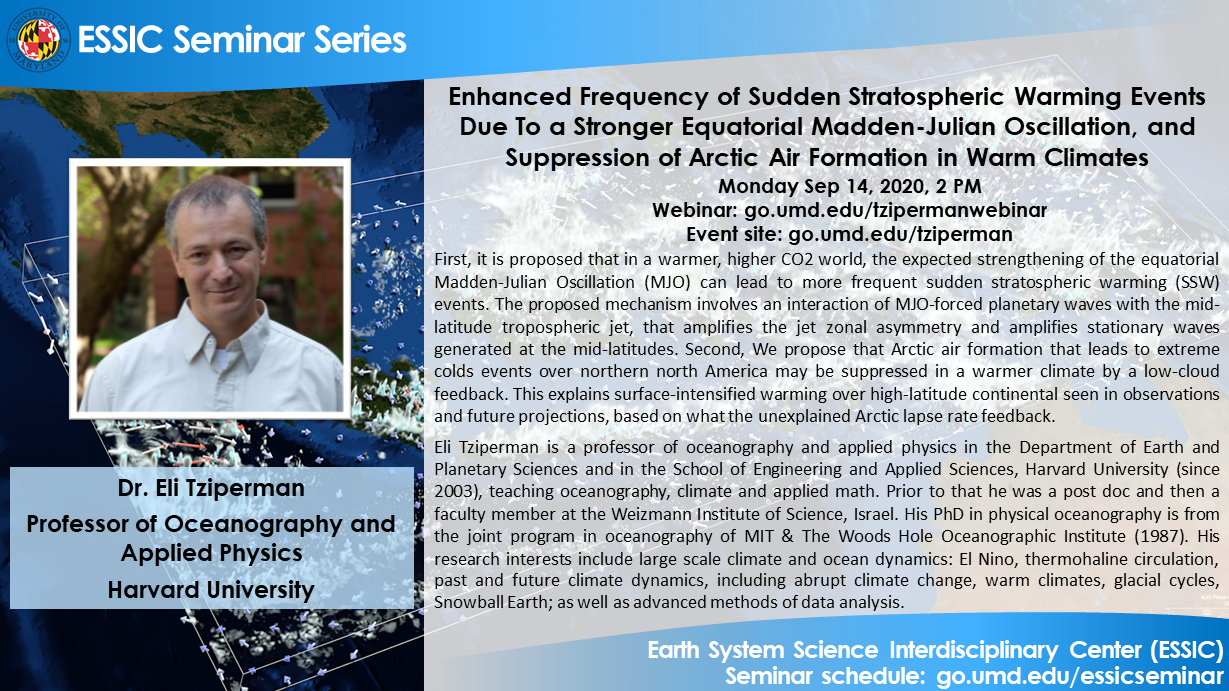
Enhanced Frequency of Sudden Stratospheric Warming Events Due To a Stronger Equatorial Madden-Julian Oscillation, and Suppression of Arctic Air Formation in Warm Climates
This event has passed. See the seminar recording here:
Dr. Eli Tziperman
Professor of Oceanography and Applied Physics
Harvard University
Monday September 14, 2020, 2 PM
Abstract:
First, it is proposed that in a warmer, higher CO2 world, the expected strengthening of the equatorial Madden-Julian Oscillation (MJO) can lead to more frequent sudden stratospheric warming (SSW) events. This may, in turn, affect tropospheric weather and extreme events. The proposed SSW enhancement mechanism involves an interaction of MJO-forced planetary waves with the mid-latitude tropospheric jet that amplifies its zonal asymmetry. This therefore amplifies the stationary waves generated at the mid-latitudes and propagating to the Arctic Stratosphere, triggering additional SSW events.
Second, we consider the process of Arctic air formation currently occurring over northern North America during the winter season’s polar night, and leading to extreme cold outbreaks further south. We propose that such Arctic air formation may be suppressed in a warmer climate by a low-cloud feedback. We show that the proposed mechanism explains recent climate observations and future climate projections, both showing an unexplained enhanced and surface-intensified warming over high-latitude continental areas that has been referred to as the Arctic lapse rate feedback. This same low winter cloud mechanism may also explain the existence of frost-intolerant animals and trees such as crocodiles and palm trees that thrived in northern North America 50 Million years ago (Eocene), where current temperatures could be as low as -40C.
Bio-sketch:
Eli Tziperman is the Pamela and Vasco McCoy, Jr. Professor of Oceanography and Applied Physics in the Department of Earth and Planetary Sciences and in the School of Engineering and Applied Sciences, Harvard University (since 2003), teaching oceanography, climate and applied math. Prior to that he was a postdoc and then a faculty member at the Weizmann Institute of Science, Israel. His PhD in physical oceanography is from the joint program in oceanography of MIT & The Woods Hole Oceanographic Institute (1987). His research interests include large scale climate and ocean dynamics: El Nino, thermohaline circulation, past and future climate dynamics, including abrupt climate change, warm climates, glacial cycles, Snowball Earth; as well as advanced methods of data analysis.
Webinar info:
Webinar thread: http://go.umd.edu/tzipermanwebinar
Event site: http://go.umd.edu/tziperman
Webinar number: 120 414 8609
Webinar password: essic
To join the audio conference only:
US Toll: +1-415-655-0002
Global call-in numbers
For IT assistance:
Cazzy Medley: cazzy@umd.edu
Travis Swaim: tswaim1@umd.edu
Resources:
Seminar schedule/archive: https://go.umd.edu/essicseminar
Seminar recordings on Youtube: https://www.youtube.com/user/ESSICUMD

